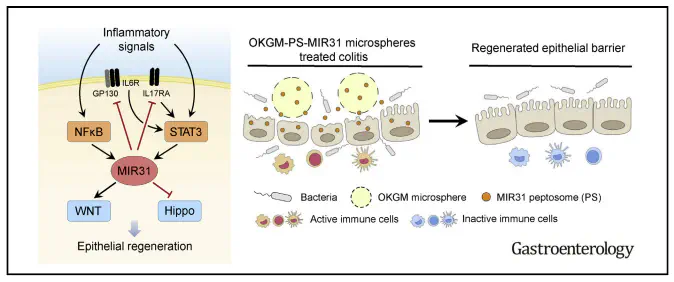MicroRNA-31 Reduces Inflammatory Signaling and Promotes Regeneration in Colon Epithelium, and Delivery of Mimics in Microspheres Reduces Colitis in Mice

Abstract
Background & aims Levels of microRNA 31 (MIR31) are increased in intestinal tissues from patients with inflammatory bowel diseases and colitis-associated neoplasias. We investigated the effects of this microRNA on intestinal inflammation by studying mice with colitis.Methods: We obtained colon biopsy samples from 82 patients with ulcerative colitis (UC), 79 patients with Crohn’s disease (CD), and 34 healthy individuals (controls) at Shanghai Tenth People’s Hospital. MIR31- knockout mice and mice with conditional disruption of Mir31 specifically in the intestinal epithelium (MIR31 conditional knockouts) were given dextran sulfate sodium (DSS) or 2,4,6-trinitrobenzene sulfonic acid (TNBS) to induce colitis. We performed chromatin immunoprecipitation and luciferase assays to study proteins that regulate expression of MIR31, including STAT3 and p65, in LOVO colorectal cancer cells and organoids derived from mouse colon cells. Partially hydrolyzed alpha-lactalbumin was used to generate peptosome nanoparticles, and MIR31 mimics were loaded onto their surface using electrostatic adsorption. Peptosome-MIR31 mimic particles were encapsulated into oxidized konjac glucomannan (OKGM) microspheres, which were administered by enema into the large intestines of mice with DSS-induced colitis. Intestinal tissues were collected and analyzed by histology and immunohistochemistry.Results: Levels of MIR31 were increased in inflamed mucosa from patients with CD or UC, and from mice with colitis, compared with controls. STAT3 and nuclear factor-κB activated transcription of MIR31 in colorectal cancer cells and organoids in response to tumor necrosis factor and interleukin (IL)6. MIR31-knockout and conditional-knockout mice developed more severe colitis in response to DSS and TNBS, with increased immune responses, compared with control mice. MIR31 bound to 3’ untranslated regions of Il17ra and Il7r messenger RNAs (RNAs) (which encode receptors for the inflammatory cytokines IL17 and IL7) and Il6st mRNA (which encodes GP130, a cytokine signaling protein). These mRNAs and proteins were greater in MIR31-knockout mice with colitis, compared with control mice; MIR31 and MIR31 mimics inhibited their expression. MIR31 also promoted epithelial regeneration by regulating the WNT and Hippo signaling pathways. OKGM peptosome-MIR31 mimic microspheres localized to colonic epithelial cells in mice with colitis; they reduced the inflammatory response, increased body weight and colon length, and promoted epithelial cell proliferation.Conclusions: MIR31, increased in colon tissues from patients with CD or UC, reduces the inflammatory response in colon epithelium of mice by preventing expression of inflammatory cytokine receptors (Il7R and Il17RA) and signaling proteins (GP130). MIR31 also regulates the WNT and Hippo signaling pathways to promote epithelial regeneration following injury. OKGM peptosome-MIR31 microspheres localize to the colon epithelium of mice to reduce features of colitis. Transcript Profiling: GSE123556.